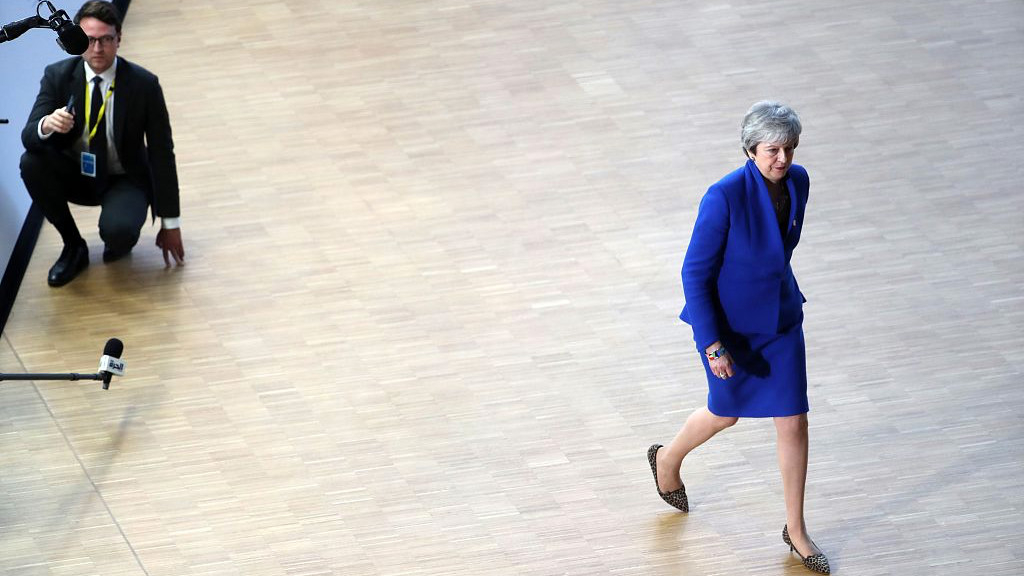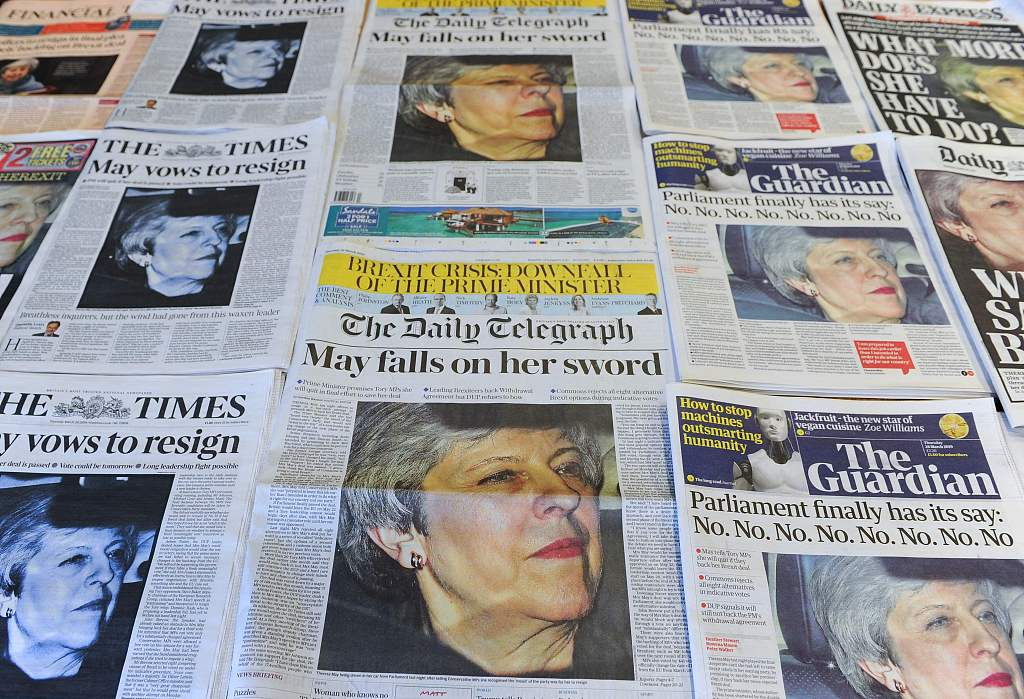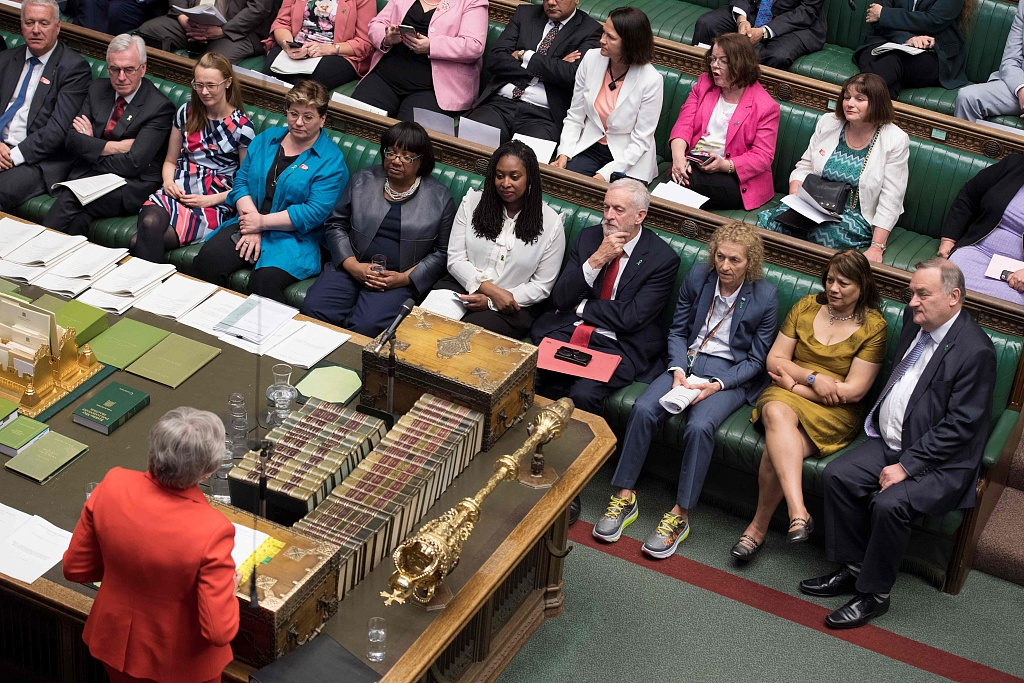
Opinion
08:44, 17-May-2019
May resigning this summer won't solve the Brexit mess
Chris Deacon

Editor's note: Chris Deacon is a postgraduate researcher in politics and international relations at the University of London and previously worked as an international commercial lawyer. The article reflects the author's opinion, and not necessarily the views of CGTN.
News emerged on Thursday that British Prime Minister Theresa May had agreed with senior members of her governing Conservative Party that she would resign this summer, resulting in a party leadership election and a new prime minister. This, however, will do nothing to change the circumstances of the Brexit gridlock in which the UK finds itself.
May confirmed to senior Members of Parliament (MPs) in her party that she would set out a timetable for her departure from office next month, with a new leader to be elected during the summer.
This was certainly never May's plan. She had previously insisted on remaining in post up until the next UK general election, but has become increasingly unpopular within her own party, dominated as it is by Brexit-supporting Eurosceptics who are highly critical of her negotiations with the European Union (EU).

An arrangement of UK daily newspapers photographed as an illustration in London on March 28, 2019. /VCG Photo
An arrangement of UK daily newspapers photographed as an illustration in London on March 28, 2019. /VCG Photo
It is from this field of Eurosceptics that the next leader of the party will almost certainly be drawn. This is because rank-and-file party members are overwhelmingly Eurosceptic themselves and it is they who will decide on the next leader. This leader will also become prime minister, without the need for a further general election, due to the nature of the UK's parliamentary system.
May's premiership may seem untenable at this point – her party, after all, has slumped in opinion polls to its lowest level of popularity in decades and appears to be set for decimation at the European Elections to be held next week – but replacing her will do little to change this, or the Brexit-related problems that have brought her down.
Most of the Eurosceptics vying to replace her are determined to renegotiate with the EU in order to improve (in their opinion) the withdrawal agreement that May has struck. Their principal concern is with the so-called "Irish Backstop" which holds the UK in an indefinite customs union with the EU unless alternative arrangements can be found to avoid the implementation of a "hard border" on the island of Ireland.
The reality, however, is that any renegotiation is highly unlikely at this point. The EU has made it quite clear that the backstop is non-negotiable, and it appears the only way to avoid it would be to agree a closer future relationship between the UK and EU, which said pro-Brexit candidates will never support.

Britain's Prime Minister Theresa May speaks during the weekly Prime Minister's Questions session in the House of Commons in London on May 15, 2019. /VCG Photo
Britain's Prime Minister Theresa May speaks during the weekly Prime Minister's Questions session in the House of Commons in London on May 15, 2019. /VCG Photo
While criticisms of May's approach to negotiations have merit in some respects, this is one point that was relatively inevitable. It is a fact of geography that a hard border would need to be introduced in Ireland unless the UK remains in structures such as the Single Market and the Customs Union. This was not May's doing and cannot be undone by any other leader.
Replacing May will also do nothing to solve the blockage in Parliament as to how to resolve Brexit. In fact, were a new Eurosceptic Conservative leader to propose a "harder" Brexit, it is almost certain that the proposal would receive even less support among MPs, and end any prospect of a grand bargain with the opposition Labour Party.
One option left would be to leave the EU without a deal; however, a clear majority of MPs are dead-set against this and almost certainly would never allow it to happen (subject to the EU doing the same).
In short, then, a new Conservative leader and prime minister will do absolutely nothing to change the hard facts causing the Brexit paralysis in the UK. Indeed, at this point, there are only two options which might lead to some progress
The first is a new election. If the new prime minister were to call a general election after assuming their position, we may see some changes among the distribution of MPs within Parliament that could alter the balance of power. There will be a lot of pressure to do this, given the lack of a public mandate, but given the current unpopularity of the Conservative Party in the country, they will be loath to do so.
The other option – which may come out of a general election, depending on the policies of each of the opposition parties and their relative success – is a second referendum on Brexit. Putting the decision back to the people – if done properly – could break the impasse by deciding on a solution once and for all.
For now, however, the Conservative Party gazes inwards and squabbles about Europe, as it has been prone to do for decades. As the French will no doubt be thinking: plus ça change, plus c'est la même chose – the more things change, the more they stay the same.
(If you want to contribute and have specific expertise, please contact us at opinions@cgtn.com.)

SITEMAP
Copyright © 2018 CGTN. Beijing ICP prepared NO.16065310-3
Copyright © 2018 CGTN. Beijing ICP prepared NO.16065310-3